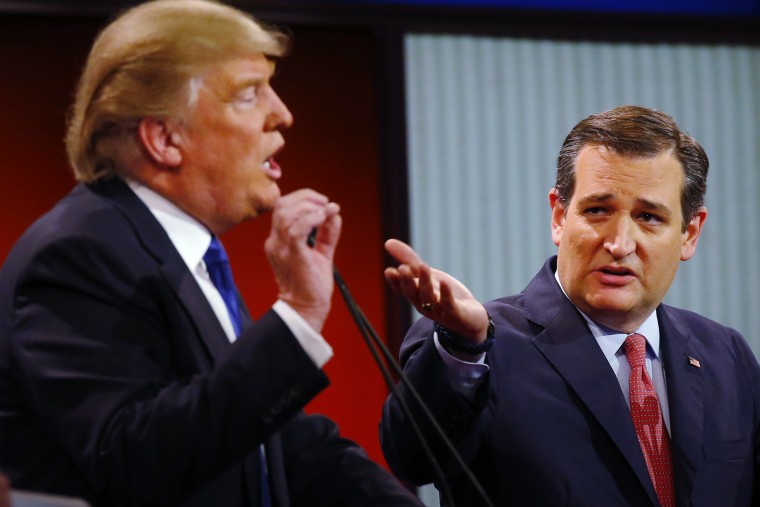In a way, it's incredibly difficult to satirize the far-right line on counter-terrorism because, in reality, the conservative rhetoric is already pretty laughable.
President Obama has launched strikes that have killed the head of al Qaeda, the head of the Taliban, the head of ISIS in Libya, a senior leader of al-Shabaab in Somalia, the al Qaeda operative in charge of suicide bombings and operations involving explosives, among many, many others. In The Atlantic, in which Jeffrey Goldberg, hardly a liberal, wrote, "Obama has become the greatest terrorist hunter in the history of the presidency."
It's against this backdrop, the joke goes, that Republicans say, "Sure, but Obama doesn't call it 'Islamic terrorism.' Counter-terrorism successes are fine, but what really matters is word choice."
Except, the joke has become real. Here was Donald Trump, the Republican Party's presumptive presidential candidate, on Twitter yesterday:
"Is President Obama going to finally mention the words radical Islamic terrorism? If he doesn't he should immediately resign in disgrace!"
Though others weren't quite so clownish, Trump wasn't alone. Sen. Ted Cruz (R-Texas) whined, "As a matter of rigid ideology, far too many Democrats -- from Barack Obama to Hillary Clinton -- will refuse to utter the words 'radical Islamic terrorism.'" Republican media personalities echoed the same line.
The preoccupation with word choice -- as opposed to, say, actual counter-terrorism successes -- is almost hard to believe. In the real world, Obama has built up a fair amount of credibility on the issue, but from a right-wing perspective, ideologically satisfying word choice is literally the only consideration. Rhetoric, the president's conservative critics argue, must trump reality.
Following up on our coverage from a while back, in the not-too-distant past, the White House issued guidelines titled, “Words that Work and Words that Don’t: A Guide for Counterterrorism Communication.” The point was to urge officials to stop describing extremists as “jihadists” or “mujahedeen,” and to drop “Islamo-fascism” altogether.
“It’s not what you say but what they hear,” the memo said in bold italic lettering.
The memo was distributed widely by federal agencies, including the State Department, the Department of Homeland Security, and the National Counter Terrorism Center, explaining to U.S. officials at every level that the rhetoric preferred by the right may undermine our foreign policy and national security interests.
A close adviser to the president conceded, “We ought to avoid the language of religion. Whenever they hear ‘Islamic extremism, Islamic jihad, Islamic fundamentalism,’ they perceive it as a sort of an attack on their faith.”
For Republicans and conservative media, all of this probably sounds like a mamby-pamby approach to national security and one more reason not to trust President Obama to be tough on national security. But there’s a catch: the White House that issued the “Counterterrorism Communication” guidelines wasn’t the Obama White House – it was the Bush/Cheney White House. The document was released in April 2008 – seven months before Obama’s inauguration.
The adviser to the president who conceded, “We ought to avoid the language of religion” was Karen Hughes, one of George W. Bush’s closest confidants.
When the Bush/Cheney team presented these rhetorical recommendations, the right did not whine incessantly. Rather, conservatives held their ire until the Democratic administration followed the Bush/Cheney guidance.
If anyone can point to any examples of Republicans complaining incessantly about George W. Bush's counter-terrorism word choice -- or better yet, suggesting he should resign from the presidency because of his phrasing -- I'll gladly update this piece accordingly. But I'm reasonably confident no such evidence exists.
